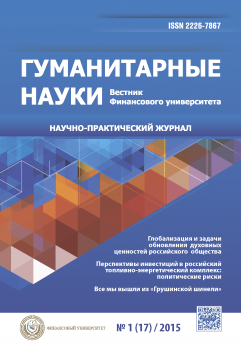The subject choice is primarily due to depletion of the previous model of Russia’s socio-economic and hence political development. Such an opinion is common both in the expert community and in the governmental structures, this has been documented. Thus, in the Guidelines for Action of the Russian Federation Government until 2018, approved 2015 May 14, have been specified three main challenges facing the Russian Federation. Of these the decline in global demand for traditional primary commodities, and geopolitical aggravating, which has led to an increase in economic and political uncertainties, actual closing of access to debt financing in foreign markets for the majority of Russian companies, restrictions on the modern technologies involvement from abroad. In other words, the Russian government has officially recognized that existed during all 25 post-soviet years model based on borrowing in international financial markets (in the 1990s — on behalf of the state, the last 15 years — by increasing the corporate debt) has exhausted itself. In this regard, a question about future development scenarios has arisen. Russia’s “sovereign” development supporters suggest a mobilization scenario more and more hardly. In particular, in August-September 2015 the presidential adviser S.Yu. Glazyev has become more active: he has made program statements in mass media, as well as has presented September 15 at a closed meeting of the Russian Federation Security Council’s Interdepartmental Commission on security in the economic and social area the report “Russia’s Competitive Potential, and Ways of Its Implementation for National Security”. In fact, at the moment the document is the country’s mobilization development program and requires a cardinal revision not only the government’s whole policy, but also the authorities’ policy in general, including political system structure changes. In addition, according to some experts’ opinion, the Russian military operation in Syria, which has begun in late September 2015, can take a protracted nature. The Russian economy, taking into account its current state and prospects, may not sustain the costs for a long-term military operation. It also updates the theme of the mobilization scenario’s possible socio-political consequences. Russia during the 20th century has survived three mobilization development attempts — two “hard” Stalin’s modernizations and, relatively speaking, a “soft” Andropov-Gorbachev one (a short war communism period can be put out of the brackets). The former two attempts can be considered as successful, among other from the socio-political point of view, and the later one — as unsuccessful. That particular failure has not allowed overcome the trends, including in the socio-political area, in large measure started processes that led to the USSR disintegration.
мобилизационный сценарий, сталинская мобилизация, человеческий капитал.
Статья подготовлена по результатам исследований, выполненных за счет бюджетных средств по Государственному заданию Финансового университета 2015 г.
1. Goncharov G.A., Backanov S.A., Grishina N.V., Pass A.A., Fockin A.A. Mobilizacionnaya model’ razvitiya rossiiskogo obzhestva v ХХ veke [The mobilization model of development of the Russian society in the twentieth century]. Chelyabinsk, 2013.
2. Hangtinton S. Politichesky poryadok v menyaushihsya obschestvah [Political Order in Changing Societies]. Moscow, 2004.
3. Inozemtsev V.L. Modernizatziya Rossii v kontekste globalizacii [Modernization of Russia in the context of globalization]. Sovremennie problemi razvitiya. Materiali teoreticheskogo seminara [Modern problems of development. Materials of a theoretical seminar]. Moscow, 2010.
4. Cheremukhin, Anton and Golosov, Mikhail and Guriev, Sergei M. and Tsyvinski, Aleh. Was Stalin Necessary for Russia’s Economic Development? September 2013. Available at: http://ssrn.com/abstract=2325798. (accessed 23 October 2015).
5. Ivan Krastev. Paradoxes of the New Authoritarianism. Journal of democracy. April 2011, Vol. 22, Number 2. P. 14-15.





